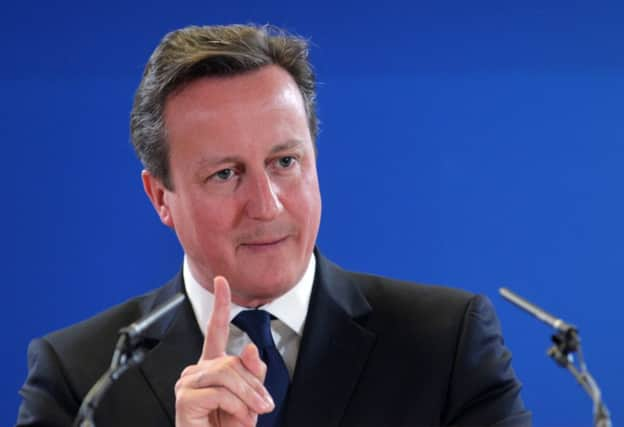I have to work with Juncker, David Cameron admits


In a statement to MPs, Mr Cameron admitted that he now “has to work with Mr Juncker” but insisted that the vote by EU heads of government to support the nomination of the ex-Prime Minister of Luxembourg was a “bad, bad day for Europe.”
Advertisement
Hide AdAdvertisement
Hide AdWhile Mr Cameron was loudly cheered by jubilant Tory backbenchers, many of whom congratulated him for standing up for Britain, he was mocked by Labour leader Ed Miliband for his “utter humiliation” in losing almost all his allies last week.
But a new poll by the former Tory treasurer Lord Ashcroft taken in the 48 hours after Mr Cameron’s EU defeat, has suggested that the Prime Minister’s firm stance has gone down well with voters with the Tories climbing to a two point lead over Labour on 33 per cent up five points to Labour’s 31 per cent, down two.
In his statement Mr Cameron insisted that he still hopes to renegotiate the UK’s place in the EU and then hold an in/out referendum in 2017..
Looking to the future, Mr Cameron said: “We must work with the new commission president as we always do to secure our national interest.
“I spoke to him last night and he repeated his commitment in his manifesto addresses British concerns about the EU.”
The Prime Minister said the issue had underlined his convictions that “Europe needs to change”.
And Mr Cameron pointed to “modest progress” in arguing for reform at the council, highlighting agreements to focus on the economy and freedom of movement.
He said: “So while Europe has taken a big step backwards in respect of the nomination of the Commission President, we did secure some small steps forward for Britain in its relationship with the EU.”
Advertisement
Hide AdAdvertisement
Hide AdBut he warned: “Last week’s outcome will make renegotiation of Britain’s relationship with Europe harder and it certainly makes the stakes higher - there will always be huge challenges in this long campaign to reform the European Union but with determination, I believe we can deliver.”
But the Labour leader tore into the Prime Minister after Mr Cameron reported to MPs on the summit, which saw European leaders vote 26-2 in favour of Mr Juncker.
Mr Miliband said: “You returned to Britain on Friday having failed. Not some mild small failure, but an appalling failure of relationship building, winning support and delivering for Britain.
“I know it is inconvenient to remind you, but you lost by 26 votes to two. And then you come to this chamber and seem to claim it as a complete vindication of your tactics.
“Your party may think it represents splendid isolation - it isn’t. It is utter humiliation.”
But responding, Mr Cameron said Mr Miliband’s claims were “weak, opportunistic and wrong”, and likened him to former Labour leader Neil Kinnock, to the delight of Tory backbenchers who roared their support.
He also mocked Mr Miliband for not being invited to the talks held in Paris on Mr Juncker by the leaders of the main socialist parties across Europe.
The Prime Minister was noticeably left to defend himself by his pro-EU Lib Dem coalition partners with no Lib Dem ministers in the Chamber for the statement even though Deputy Prime Minister Nick Clegg had also opposed Mr Juncker’s appointment.
Advertisement
Hide AdAdvertisement
Hide AdThe Prime Minister was also urged to set up a committee to set out “red and blue lines” to show exactly his position on different issues.
Labour’s Frank Field, chairman of the cross-party Group on balanced migration, drew comparisons with European talks led by former Labour prime minister Harold Wilson, who he said cleverly claimed he gained “fundamental changes” but never outlined what they were.
SEE ALSO